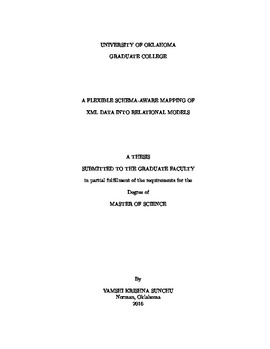| dc.contributor.advisor | Weaver, Chris | |
| dc.contributor.author | Sunchu, Vamshi Krishna | |
| dc.date.accessioned | 2016-08-17T19:23:37Z | |
| dc.date.available | 2016-08-17T19:23:37Z | |
| dc.date.issued | 2016-08 | |
| dc.identifier.uri | https://hdl.handle.net/11244/44903 | |
| dc.description.abstract | In the last several years, substantial contributions have been made in the development of techniques to transform and store eXtensible Markup Language (XML) data into relational database models. Although there exists rich literature in this field, none of the existing procedures provides a complete solution in a single framework as many of the existing solutions propose automating the conversion. However, a purely automated approach has limitations. Due to the heterogeneous and hierarchical nature of XML for a given input, there can be numerous reasonable relational schemas and automated systems may not be able to address all the possible schemas. Providing Human guidance can help to identify appropriate relational schema in complex XML documents for use in highly structured data applications.
We propose an integrated system that provides an end-to-end solution for the user-guided mapping of XML into relational data. Our system accomplishes the translation in three stages: (1)Parse an XML Schema Definition (XSD) file to suggest relational schema; (2) allow users to alter the schema using the user interface to determine appropriate schema; and (3) populate relational tables using an input XML document. The system extracts key information from the input file and introduces new constraints wherever required as keys are crucial for a good database design. The User Interface is the key component of our system, enables users to perform certain operations on the suggested schema to achieve a reliable relational schema.
The Digital Latin Library (DLL) is a joint project with a vision to introduce an open collaborative environment that allows users to explore latin texts
critical editions and engage them in intellectual conversations. Here, visualizations are chosen for enabling scholarly conversations. Text Encoding Initiative (TEI) is often used for the representation of critical editions. TEI is a markup language to create digital versions of texts and its structure is similar to XML. To achieve DLL objectives, we devised a supporting system to read XML structure into a relational data model. This data model, in turn, supports the development of a variety of visualization queries. | en_US |
| dc.language | en_US | en_US |
| dc.subject | Computer Science | en_US |
| dc.subject | XML to Relational Mapping Technique | en_US |
| dc.title | A Flexible Schema-Aware Mapping of XML Data into Relational Models | en_US |
| dc.contributor.committeeMember | Grant, Christan | |
| dc.contributor.committeeMember | Thulasiraman, K | |
| dc.date.manuscript | 2016-07 | |
| dc.thesis.degree | Master of Science | en_US |
| ou.group | College of Engineering::School of Computer Science | en_US |
